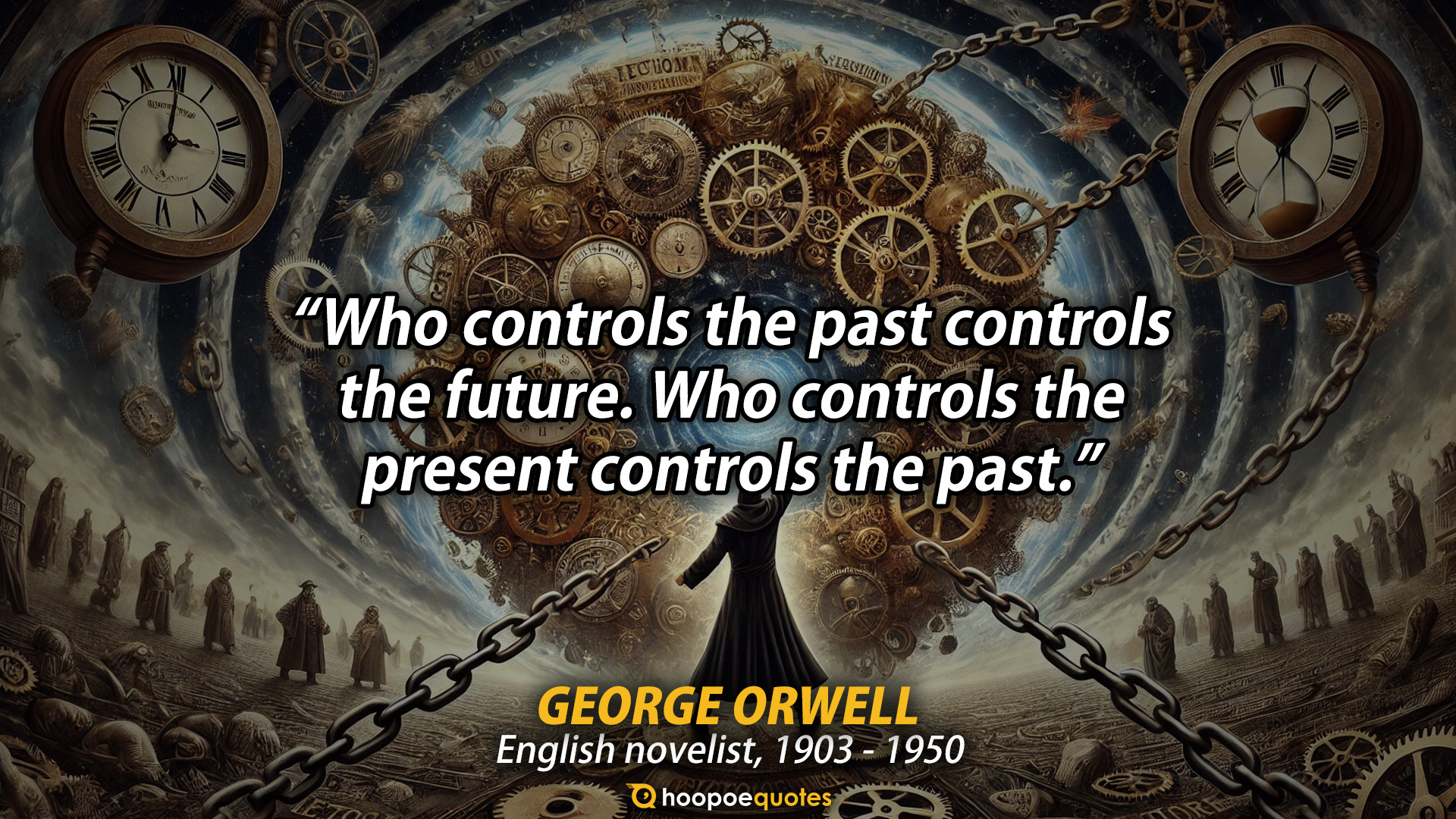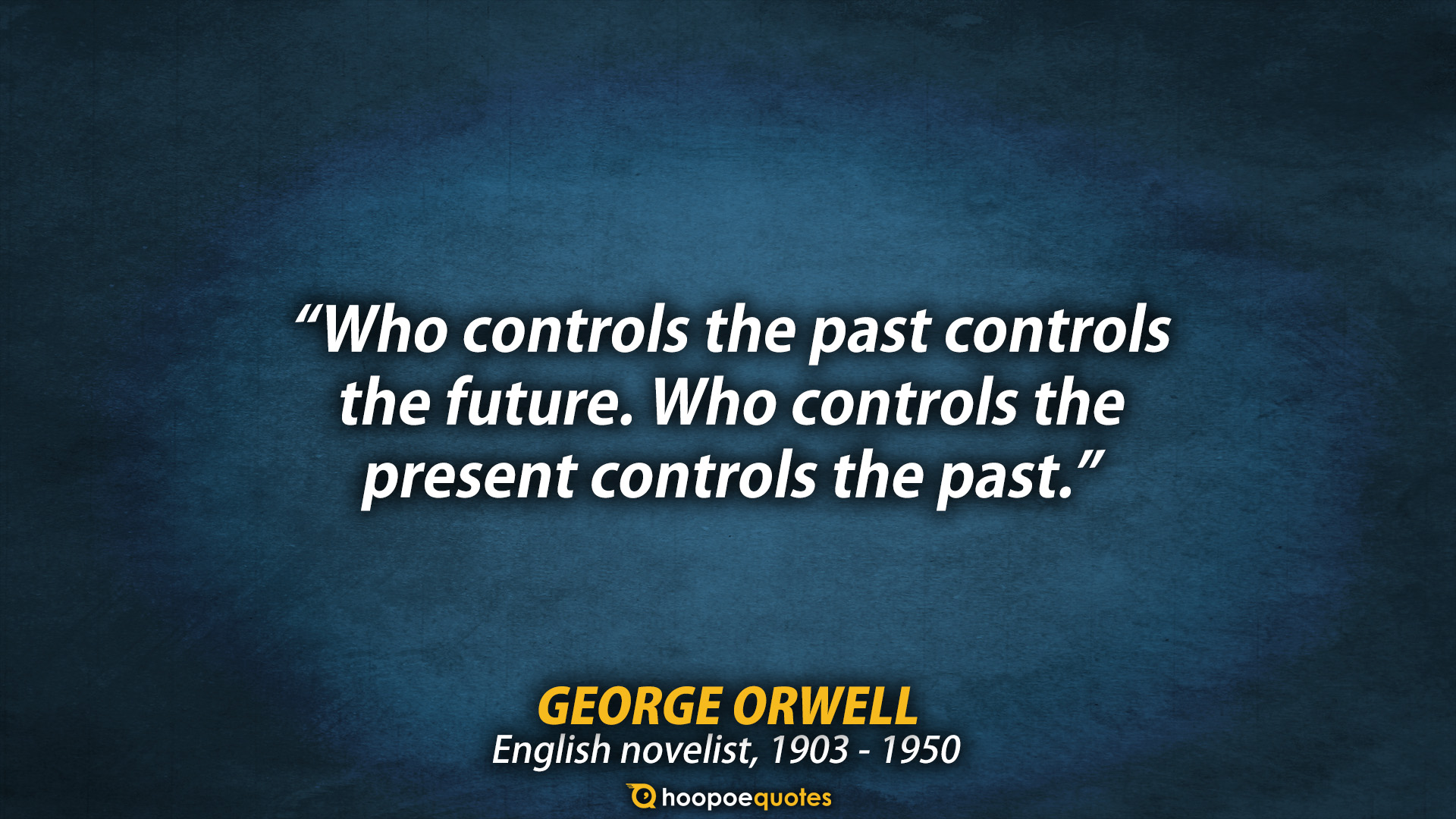Disclosure: This post may contain affiliate links, meaning we get a commission if you decide to make a purchase through our links, at no cost to you.
Introduction: Orwell's Crystal Ball
Alright, listen up! George Orwell wasn't just some dude with a pen; he was a freakin' prophet. His words slice through the BS and hit you right where it hurts—your complacency. And this quote? It's a knockout punch.
"Who controls the past controls the future. Who controls the present controls the past." Orwell's words ring louder than ever in our tech-crazy, info-overloaded world. This isn't just some dusty old sentence from a history book; it's a warning, a prophecy, and a battle cry all rolled into one. In this article, we're diving deep into this quote's guts to see what makes it tick and why it matters now more than ever.

Understanding Orwell's Quote: A Deep Dive
First off, let's crack open this quote. Orwell was a master of peeling back the layers of society’s bullshit. This quote from "1984" is his way of saying, "Hey, pay attention! Whoever's got their hands on the history books is pretty much calling the shots for the future."
Think about it. If you can rewrite history, you can manipulate how people think about the present and future. It's like having a cheat code to control reality. This isn't just about governments; it's about any power structure—media, corporations, you name it.
Orwell’s Life and Why He Matters
George Orwell, born Eric Arthur Blair, was a guy who saw the world for what it was—a mess of power struggles, lies, and control. He lived through wars, saw the rise of totalitarian regimes, and was like, "Hell no, not on my watch!" His books, especially "1984," are his way of fighting back, using words as weapons to cut through the crap.

In "1984," Orwell paints a dystopian picture where Big Brother—think of it as the ultimate creepy stalker—controls everything. History is constantly rewritten to fit the current narrative. If you can change the past, you can justify anything in the present. War? Peace? Oppression? Freedom? It’s all just a matter of perspective when you control the narrative.
Historical Shenanigans
History is full of examples where controlling the past meant controlling the future. Take the Soviet Union, for instance. Stalin erased people from photos and rewrote textbooks to fit his version of events. It’s like history was his personal Etch A Sketch.
Philosophical Musings
Philosophically, Orwell's quote ties into ideas from heavyweights like Nietzsche, who talked about the power of perspective. If you control the narrative, you shape reality. It’s a philosophical power play, pure and simple.
Psychological Trickery
Psychologically, this quote messes with our heads. Our memories and perceptions of reality are fragile and easily manipulated. Cognitive biases, misinformation, and selective memory play into the hands of those who control the narrative. It's a mental chess game, and we're often the pawns.

The Digital Age of Misinformation
Fast forward to today, and Orwell's quote is practically screaming at us. In the age of the internet, social media, and 24/7 news cycles, controlling the narrative is more important—and easier—than ever. Fake news, deep fakes, and information overload mean that whoever shouts the loudest often gets to decide what's "true."
Real-World Examples
Look at how social movements use history to fuel their causes. Black Lives Matter, for instance, draws on a historical narrative of systemic racism to push for change. On the flip side, authoritarian regimes still manipulate history to maintain control. It's Orwellian dystopia meets real life.

Personal Reflection: Making Orwell Proud
Orwell’s quote isn't just about politics or history; it's a wake-up call for all of us. We've got to stay sharp, question everything, and never take "facts" at face value. It's about being proactive in seeking the truth, no matter how uncomfortable it might be.
So how do we live by Orwell's words? Stay informed, think critically, and don’t be afraid to challenge the status quo. Read diverse sources, verify facts, and keep an eye on who’s controlling the narrative.

George Orwell dropped some serious wisdom with this quote. It's a reminder that power isn't just about armies and money—it's about controlling the story. By understanding this, we can be better equipped to face the future with our eyes wide open, ready to call out the BS and fight for the truth.
References and Further Reading
- Orwell, George. "1984."
- Nietzsche, Friedrich. "On the Genealogy of Morality."
- Zuboff, Shoshana. "The Age of Surveillance Capitalism."
- Harari, Yuval Noah. "Sapiens: A Brief History of Humankind."
Similar Quotes
- "For my part I consider that it will be found much better by all parties to leave the past to history, especially as I propose to write that history myself." — Winston Churchill
- "Those who cannot remember the past are condemned to repeat it." — George Santayana
Thought Exercises
- Media Detox: Spend a day without any news or social media. Reflect on how it affects your perception of current events.
- Historical Investigation: Pick a historical event and research it from multiple perspectives. Notice how the narrative changes.
Remember, folks, the future is in your hands—so keep your grip tight and your mind sharper.













![[50+ Images] Birthday Wishes for Someone Special in Your Life Quotes](/media/k2/items/cache/b1dbe5e313fb0e0a26b2b36062a36d3a_M.jpg)
